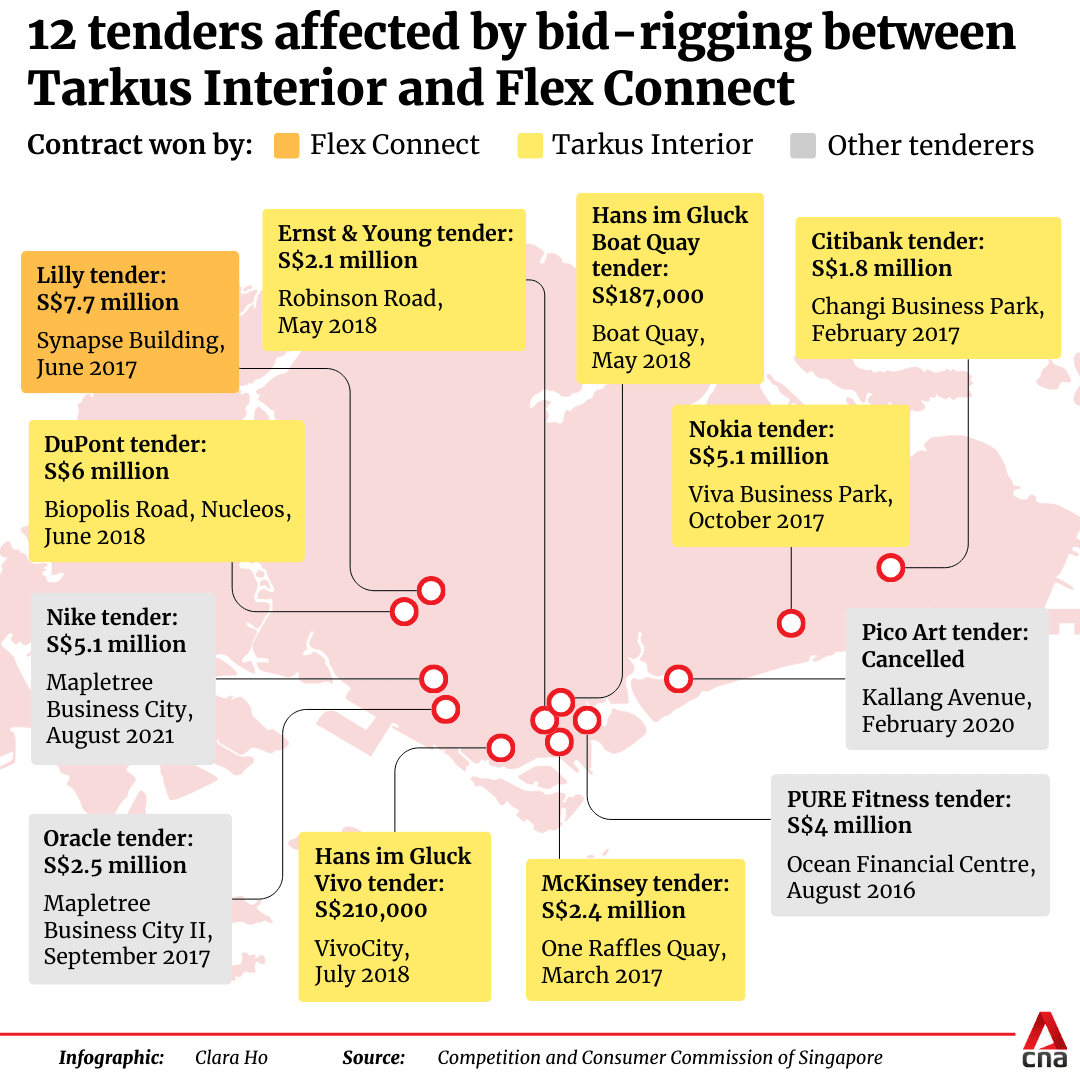Singapore interior construction firms penalised S$10 million for rigging bids
The two companies - Flex Connect and Tarkus Interiors - colluded to provide bid details to the other firm, allowing one of them to submit a higher bid to stand a better chance of securing projects.


This audio is generated by an AI tool.
SINGAPORE: For colluding in high-value tenders in order to secure projects, two interior fit-out contractors were penalised nearly S$10 million (US$7.3 million) by Singapore's competition regulator, the most severe such penalty to date.
Flex Connect - formerly known as Facility Link - and Tarkus Interiors, both of which handle interior decoration and finishing works for commercial properties, were found to have engaged in bid-rigging conduct. They were penalised S$4,885,263 and S$5,113,918 respectively.
The two companies have until Feb 20, 2025, to pay their respective penalties, or until then to file an appeal.
Both firms rigged bids over a five-year period, from August 2016 to August 2021, affecting 12 tenders with between S$187,000 and S$7.7 million in value, said the Competition and Consumer Commission of Singapore (CCCS) on Friday (Dec 20). Including this case, the CCCS has handled seven bid-rigging cases to date.
In total, the affected tenders had a value of around S$34.1 million.
WHO WAS AFFECTED
The 12 tenders were for premises at retail, food and beverage establishments and offices.
They are:
- PURE Fitness at Ocean Financial Centre
- Citibank at Changi Business Park
- Oracle at Mapletree Business City II
- Ernst & Young at Robinson Road
- Hans im Gluck at Boat Quay and VivoCity
- Lilly at Synapse Building
- DuPont at Nucleos, Biopolis Road
- Nokia at Viva Business Park
- Pico Art at Kallang Avenue
- Nike at Mapletree Business City
- McKinsey One Raffles Quay

Of these, seven tenders - Citibank, McKinsey, Nokia, Ernst & Young, Hans im Gluck and DuPont - were won by Tarkus Interior.
Only one - Lilly's clinical facility - was won by Flex Connect. Of the remaining four, three tenders - involving PURE Fitness, Oracle and Nike - were not won by either of the two companies. The last tender involving Pico Art's creative centre was cancelled.
HOW BIDS WERE RIGGED
To rig bids, one of the firms - designated the winner - would provide bid pricing and other details to the other firm, which would then submit a higher bid to give the "winning" firm a better chance of securing the tender.
This, said CCCS, was how the pair eliminated competitive pressure that would have resulted in them submitting best offers to customers.
"As a result of the conduct, potential customers were not able to receive truly competitive offers from (the two businesses), thus potentially overpaying for these tenders," said CCCS.
CCCS assistant director of legal and enforcement Ng Yee Ting said during a press conference that a number of clients had potential contractors sign agreements stopping them from discussing pricing or any other details with competitors or third parties.
However, Tarkus Interior and Flex Connect did so through email or WhatsApp correspondence.
In the tender for Lilly's clinical facility, which had the highest tender value at S$7.7 million, Flex Connect prepared the bid pricing and details for Tarkus Interior to submit. In an email, Flex Connect, the "designated winner" in this case, then provided a breakdown of the prices for lighting, scaffolding, and other aspects.
Eventually, out of the six invited tenderers, Flex Connect won.
CCCS group director of legal and enforcement Winnie Ching noted that in all the cases, only a limited pool of tenderers - up to six - were invited. Tarkus Interior and Flex Connect were the only two tenderers to have been called for works at Hans im Gluck Boat Quay and VivoCity.
Even if neither firm eventually won the tender, the client could have been affected in the way they approached their evaluation of the bids, Ms Ching said.
She pointed out that a company's failure to win the tender did not negate the impact its bid-rigging behaviour had on the tender process.
Even if the client was not affected, the bidding company would still have broken the law, said Ms Ching.
Clients affected by the rigged bids may seek recourse by filing a civil suit in court.
INVESTIGATIONS
Investigations into the firms' conduct started in November 2020, following a tip-off from a member of the public who received information from an anonymous source.
Evidence was seized during a raid at the firms' business premises, including copies of WhatsApp chats.
The CCCS team then had to comb through thousands of documents and interview numerous witnesses in an investigation process that spanned four years.
Both firms tried to justify their conduct by claiming that they were at risk of being excluded from future tenders if they declined to participate in a tender.
However, CCCS found that the excuse did not hold water. Ms Ching said that clients that they spoke to about this said they would not have penalised the firms for declining to participate in a tender.
"The (firms') collusive conduct effectively reduced the number of shortlisted tenderers genuinely competing and gave customers the false appearance of competition for their tenders," CCCS said.
The agency highlighted that Flex Connect and Tarkus Interior were among only 44 businesses registered under the Building Construction Authority that could bid for high-value government projects. These projects have an unlimited tender value for interior decoration and finishing works. There were no government projects among the 12 tenders in question.
HOW CCCS CAME TO ITS DECISION
As part of the legal process under the Competition Act 2004, CCCS issued a proposed infringement decision to the two firms on May 23 this year. The proposed infringement decision is a written notice that sets out the CCCS' decision. It gives the involved parties a chance to make arguments before CCCS decides whether there has been an infringement.
Each firm submitted written representations before CCCS came to its final decision.
CCCS considered each business' relevant turnover, the nature and seriousness of their breaches, and the aggravating and mitigating factors in making a decision.
Flex Connect had applied for and was granted leniency during initial investigations, and the CCCS reduced its financial penalty. The team declined to reveal the discount awarded to Flex Connect.
Tarkus Interior was informed of the leniency programme but did not apply.
"CCCS’ leniency programme affords lenient treatment to businesses or individuals that are part of a cartel agreement or concerted practice, when they come forward early to CCCS with information on their cartel activities," said the CCCS. Such businesses may receive a full waiver or have their financial penalties reduced.
Elaborating on how the programme works, Ms Ching said that a company that comes clean before the start of investigations may receive full immunity.
"That's because what we're trying to do is say, get people in so that they tell us about anti-competitive conduct, so that we can take action," said Ms Ching.
However, this discount is reduced if the company comes in at a later stage.
The competition watchdog has seen cases in the past where employees engage in anti-competitive behaviour without the knowledge of the firm's management. When the management learns of the conduct, it then approaches CCCS early to gain immunity.
In other cases, employees engage in anti-competitive behaviour under the misconception that they are simply "helping out a friend" to win a tender.
"The very reason why these customers called the tender was to encourage competition. The discussions between competitors in their bids is the antithesis of that competitive tender that they're trying to achieve," said Ms Ching.
CCCS' chief executive Alvin Koh said that bid rigging was a "serious infringement" of Singapore’s competition laws that harms both businesses and consumers.
Such conduct distorts the competitive bidding process, drives up prices and prevents customers from getting the best value for their tenders, Mr Koh said.
"Ultimately, the Singapore consumer and society pays. To ensure our markets work well, CCCS will take firm action if we find that tenderers are colluding or participating in any anti-competitive discussions.
“CCCS advises any businesses approached to participate in anti-competitive agreements to immediately refuse and publicly distance itself from such discussions."
Those who wish to provide information on cartel activities can write, email, or call the CCCS hotline at 1800 325 8282.

















